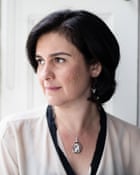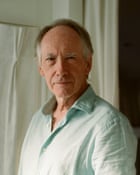Hilary Mantel remembered: ‘She was the queen of literature’ | Hilary Mantel
Anne Enright: ‘She bristled with intelligence’
Irish writer best known for her Booker prize-winning novel The Gathering
Hilary Mantel recently spent time in west Cork where she had acquired a house. It was her intention to reclaim her European citizenship by way of the Irish passport to which she was entitled. There were times in her life when her Irish ancestry was less important to her, but after the Brexit referendum it had become central again.
Mantel grew up in a pocket of Irish immigrants that lodged in Hadfield, a stony town in the High Peak of Derbyshire. Her mother was a mill-girl, her grandmother did not know her own date of birth. She described a childhood so frugal and windswept that she was 11 years old before she saw a rose. Her family was part of a declining Irish population in a town where tensions between Catholic and Protestant played out in daily life. This sense of displacement made history important to Mantel, whose childhood was haunted by the figures of the dead, not least the men who did not return with her beloved grandfather from the first world war. Mantel felt presences from an early age and was not fully at home in her own skin. When she was eight, she had a vision of “a body inside my body … budding and malign”, in part because she realised that she would not grow up to be a boy. When her parents’ marriage ended, she fell into repeated fevers, lost her thick hair, and turned into a child the local doctor called “little miss Neverwell”.
Mantel bristled with intelligence, looked at everything, saw everything. She described herself as a slightly pedantic small girl. “Few people acted with any malice towards me, it was just that I was unsuited to being a child.” With the uneasy energy of her early life, Mantel made rigorous and unsettling work about history, the body and the unknowable. The strangeness of the past made sense to her.
Her last interviews returned to the fact that she came from a family of immigrants. Her work about the court of Henry VIII might have placed her at the heart of a British nationalist revival, but Mantel had no interest in any such a thing. Her brilliance depended, to the last, on the piercing eye of a writer who is an outsider, one who is never fully at home.

Kamila Shamsie: ‘She was incredibly gracious and generous’
Pakistani and British writer of Burnt Shadows and Home Fire
How many of us, at the start of the first lockdown, had a breezy confidence that it wouldn’t last very long and in the meantime at least we would have the company of Mantel’s The Mirror and the Light (published on 5 March 2020) to take us through the dark times? I was certainly of that number, and plunged into the third book of her Cromwell trilogy, correctly assured that here was a writer with the ability to pull me into her world, no matter how distracting the news of the world around me might be. I intended to read while taking notes – I was due to interview Hilary about her new novel at the Manchester literature festival in April that year – but all plans of note-taking were quickly abandoned in favour of the pure immersive pleasure of the novel. And anyway, why did I need notes? There was no shortage of questions I already had to ask one of the greatest writers on the planet. But the one question I really wanted the answer to might just have been the one that even Mantel couldn’t answer: how exactly is your brain wired?
Mantel was that rare writer whom you read and think, I have no idea how your brain goes where it goes, and how it comes back to produce the work that it does. It is a matter of immense sadness that I will never again hear the words “new novel by Hilary Mantel”, and the only consolation is the books that she has left us with.
I deeply regret never having the chance to speak to her about The Mirror and the Light – not only for the public conversation, but for the few minutes of private talk that would precede and perhaps follow it. In my few short encounters with Mantel, she was incredibly gracious and generous. I always walked away thinking: “One day, we’ll sit down for a proper chat and we’ll have a really good laugh.”

Maggie O’Farrell: ‘She leaves behind a huge, unfillable vacuum’
Northern Irish writer whose novel Hamnet won the 2020 Women’s prize for fiction
We have lost another monarch this week. Mantel was queen of literature, and her reign was, like Elizabeth II’s, long, varied and uncontested. She leaves behind a huge, unfillable vacuum, a deep sense of loss for the reading public, and a toweringly significant body of work.
As a writer, Mantel was fierce, fabulous and fearless. In her books, she took risks, she pushed back the boundaries of narrative, she grabbed hold of novelistic rules and shook them by the neck until they obeyed her. Everything she wrote, whether it was memoir, journalism, contemporary novels or weighty historical trilogies, showed the labour involved in her work – and also her love of that labour. I challenge anyone to find a word or even a comma out of place; there isn’t an ounce of fat on the bones of her work, even the books that cover 900-odd pages. It’s clear from her prose that she was profoundly committed to her craft, to editing and re-editing and redrafting it into perfection. Her voice on the page is unmistakable; it’s possible to deduce within a paragraph whether or not it was written by her. That perspicuity, those elegant sub-clauses, that precision, the psychological acuity, her logophilic daring.
As a person, she was unfailingly generous, making time to support and champion the work of other writers. She always held the ladder for those coming up behind her, which is not always the case with someone of Mantel’s stature. She loved her own work; she loved the work of others and she wanted to share it all with the world.
How fortunate we were to have her. How much poorer our shelves will be without the novels she might have gone on to write. She said in a recent interview that she believed in an afterlife and her novels often grappled with a perforated membrane between life and death. Let’s hope she has reached her ideal posthumous location, perhaps a well-stocked library. Rest in peace, Queen Hilary. You will be missed.

Ian McEwan: ‘She helped us know ourselves as a nation’
British writer known for his novels Atonement and Enduring Love
To borrow Updike’s phrase, Hilary Mantel gave history its beautiful due. In doing so she deployed breathtaking resources of literary skill, and helped us know ourselves as a nation. The Wolf Hall trilogy will stand as her monument, but her backlist is full of wonders. She was also brilliant, witty company with a distinctive mode of scepticism that was all her own.

Sarah Waters: ‘She was the UK’s greatest living writer’
Welsh author of Tipping the Velvet and Fingersmith
I remember selling Hilary’s books when I worked in a bookshop in the late 1980s, and it’s astonishing to think that, already an established writer then, she still had a further 30-year career ahead of her. Many authors do their most significant work early on and then simply repeat it, but she was one of those really extraordinary writers who start off great and just get even better.
Her literary longevity came partly, perhaps, from the fact that she was able to take her fiction in so many different directions; she was as at home in historical epics as she was in tight domestic dramas, as comfortable with fable as with naturalism. She is best known for her marvellous Thomas Cromwell trilogy, but it’s her more gothic, female-centred novels that have inspired me most, especially the creepy masterpiece Eight Months on Ghazzah Street and the sublime Beyond Black.
I associate her with two other fiercely intelligent and darkly mischievous British writers, Muriel Spark and Beryl Bainbridge: like theirs, her work has always resisted easy categorisation and has been all the more fascinating for it. I met her only a couple of times, and she was unfailingly kind and generous, but I was as flustered in her presence as if I was meeting royalty – which, in a way, I think I was. She was the UK’s greatest living writer, and her death is a dreadful loss.

Anne Enright: ‘She bristled with intelligence’
Irish writer best known for her Booker prize-winning novel The Gathering
Hilary Mantel recently spent time in west Cork where she had acquired a house. It was her intention to reclaim her European citizenship by way of the Irish passport to which she was entitled. There were times in her life when her Irish ancestry was less important to her, but after the Brexit referendum it had become central again.
Mantel grew up in a pocket of Irish immigrants that lodged in Hadfield, a stony town in the High Peak of Derbyshire. Her mother was a mill-girl, her grandmother did not know her own date of birth. She described a childhood so frugal and windswept that she was 11 years old before she saw a rose. Her family was part of a declining Irish population in a town where tensions between Catholic and Protestant played out in daily life. This sense of displacement made history important to Mantel, whose childhood was haunted by the figures of the dead, not least the men who did not return with her beloved grandfather from the first world war. Mantel felt presences from an early age and was not fully at home in her own skin. When she was eight, she had a vision of “a body inside my body … budding and malign”, in part because she realised that she would not grow up to be a boy. When her parents’ marriage ended, she fell into repeated fevers, lost her thick hair, and turned into a child the local doctor called “little miss Neverwell”.
Mantel bristled with intelligence, looked at everything, saw everything. She described herself as a slightly pedantic small girl. “Few people acted with any malice towards me, it was just that I was unsuited to being a child.” With the uneasy energy of her early life, Mantel made rigorous and unsettling work about history, the body and the unknowable. The strangeness of the past made sense to her.
Her last interviews returned to the fact that she came from a family of immigrants. Her work about the court of Henry VIII might have placed her at the heart of a British nationalist revival, but Mantel had no interest in any such a thing. Her brilliance depended, to the last, on the piercing eye of a writer who is an outsider, one who is never fully at home.

Kamila Shamsie: ‘She was incredibly gracious and generous’
Pakistani and British writer of Burnt Shadows and Home Fire
How many of us, at the start of the first lockdown, had a breezy confidence that it wouldn’t last very long and in the meantime at least we would have the company of Mantel’s The Mirror and the Light (published on 5 March 2020) to take us through the dark times? I was certainly of that number, and plunged into the third book of her Cromwell trilogy, correctly assured that here was a writer with the ability to pull me into her world, no matter how distracting the news of the world around me might be. I intended to read while taking notes – I was due to interview Hilary about her new novel at the Manchester literature festival in April that year – but all plans of note-taking were quickly abandoned in favour of the pure immersive pleasure of the novel. And anyway, why did I need notes? There was no shortage of questions I already had to ask one of the greatest writers on the planet. But the one question I really wanted the answer to might just have been the one that even Mantel couldn’t answer: how exactly is your brain wired?
Mantel was that rare writer whom you read and think, I have no idea how your brain goes where it goes, and how it comes back to produce the work that it does. It is a matter of immense sadness that I will never again hear the words “new novel by Hilary Mantel”, and the only consolation is the books that she has left us with.
I deeply regret never having the chance to speak to her about The Mirror and the Light – not only for the public conversation, but for the few minutes of private talk that would precede and perhaps follow it. In my few short encounters with Mantel, she was incredibly gracious and generous. I always walked away thinking: “One day, we’ll sit down for a proper chat and we’ll have a really good laugh.”

Maggie O’Farrell: ‘She leaves behind a huge, unfillable vacuum’
Northern Irish writer whose novel Hamnet won the 2020 Women’s prize for fiction
We have lost another monarch this week. Mantel was queen of literature, and her reign was, like Elizabeth II’s, long, varied and uncontested. She leaves behind a huge, unfillable vacuum, a deep sense of loss for the reading public, and a toweringly significant body of work.
As a writer, Mantel was fierce, fabulous and fearless. In her books, she took risks, she pushed back the boundaries of narrative, she grabbed hold of novelistic rules and shook them by the neck until they obeyed her. Everything she wrote, whether it was memoir, journalism, contemporary novels or weighty historical trilogies, showed the labour involved in her work – and also her love of that labour. I challenge anyone to find a word or even a comma out of place; there isn’t an ounce of fat on the bones of her work, even the books that cover 900-odd pages. It’s clear from her prose that she was profoundly committed to her craft, to editing and re-editing and redrafting it into perfection. Her voice on the page is unmistakable; it’s possible to deduce within a paragraph whether or not it was written by her. That perspicuity, those elegant sub-clauses, that precision, the psychological acuity, her logophilic daring.
As a person, she was unfailingly generous, making time to support and champion the work of other writers. She always held the ladder for those coming up behind her, which is not always the case with someone of Mantel’s stature. She loved her own work; she loved the work of others and she wanted to share it all with the world.
How fortunate we were to have her. How much poorer our shelves will be without the novels she might have gone on to write. She said in a recent interview that she believed in an afterlife and her novels often grappled with a perforated membrane between life and death. Let’s hope she has reached her ideal posthumous location, perhaps a well-stocked library. Rest in peace, Queen Hilary. You will be missed.

Ian McEwan: ‘She helped us know ourselves as a nation’
British writer known for his novels Atonement and Enduring Love
To borrow Updike’s phrase, Hilary Mantel gave history its beautiful due. In doing so she deployed breathtaking resources of literary skill, and helped us know ourselves as a nation. The Wolf Hall trilogy will stand as her monument, but her backlist is full of wonders. She was also brilliant, witty company with a distinctive mode of scepticism that was all her own.

Sarah Waters: ‘She was the UK’s greatest living writer’
Welsh author of Tipping the Velvet and Fingersmith
I remember selling Hilary’s books when I worked in a bookshop in the late 1980s, and it’s astonishing to think that, already an established writer then, she still had a further 30-year career ahead of her. Many authors do their most significant work early on and then simply repeat it, but she was one of those really extraordinary writers who start off great and just get even better.
Her literary longevity came partly, perhaps, from the fact that she was able to take her fiction in so many different directions; she was as at home in historical epics as she was in tight domestic dramas, as comfortable with fable as with naturalism. She is best known for her marvellous Thomas Cromwell trilogy, but it’s her more gothic, female-centred novels that have inspired me most, especially the creepy masterpiece Eight Months on Ghazzah Street and the sublime Beyond Black.
I associate her with two other fiercely intelligent and darkly mischievous British writers, Muriel Spark and Beryl Bainbridge: like theirs, her work has always resisted easy categorisation and has been all the more fascinating for it. I met her only a couple of times, and she was unfailingly kind and generous, but I was as flustered in her presence as if I was meeting royalty – which, in a way, I think I was. She was the UK’s greatest living writer, and her death is a dreadful loss.
